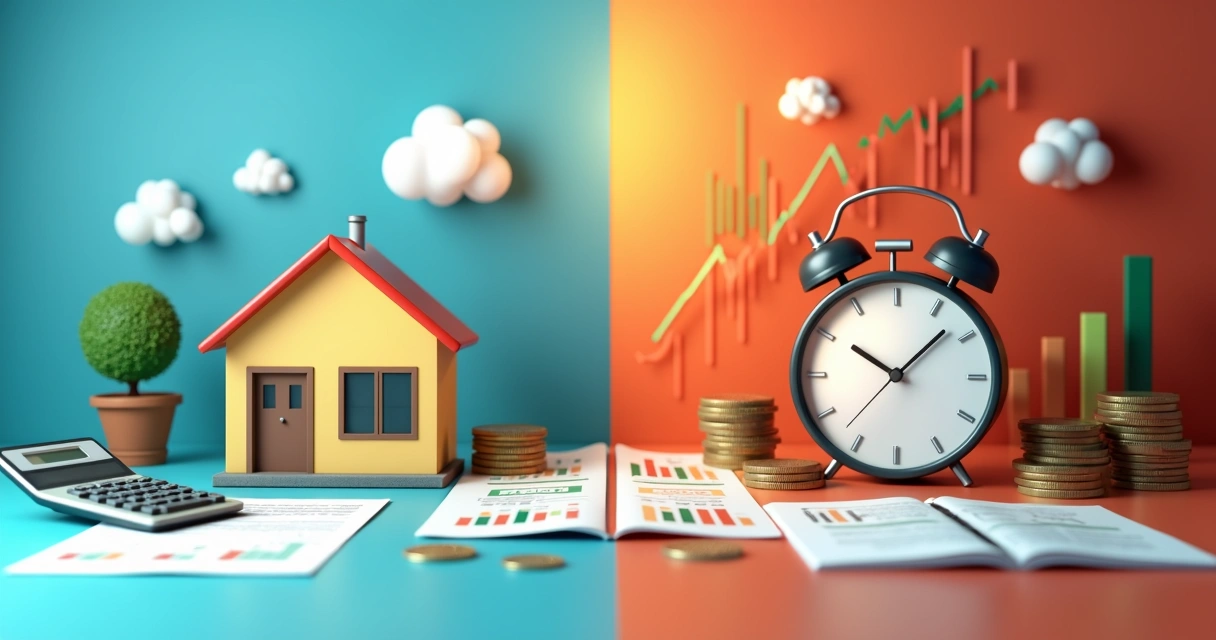Buying a home is a huge step. For many, it’s one of the biggest decisions in life, both personally and financially.
When you’re looking at financing, there is one question that can feel baffling: fixed rate or variable rate mortgage? Which one is best for you—now, and for your future?
Honestly, there’s no answer that fits everyone. Sometimes what looks right today can feel completely wrong tomorrow, depending on life’s twists, market swings, or just a shift in your peace of mind.
Let’s walk through this—slowly, step by step. Because choosing your mortgage rate should be about your story, not just about numbers.
How fixed rate mortgages work
A fixed rate mortgage is straightforward. You lock in an interest rate when you sign, and that rate stays the same throughout the agreed period. Your monthly payments never change because your rate never changes.
Stability. Predictability. No surprises in your mailbox.
Many people appreciate this security. If you’re the kind of person who likes to plan far ahead and dislikes uncertainty, this can feel comforting. The rates are upfront, and you know exactly what you’re in for—month after month.
- Your payment remains the same. Even if global markets spin out of control.
- It’s easier to manage your budget. You won’t get an unexpected increase.
- You are protected from interest rate hikes. If rates rise in five years, your payment will not.
There's a subtle downside, though. If the market rates fall, you’re still locked to your initial higher rate. Sometimes, you end up paying more over the years.
Surprisingly, even though fixed rates might seem the safer choice, in countries like Portugal, only about 4% of mortgages use a fixed rate. Most people prefer the other route. There’s a story there—which is coming up.
What makes a variable rate mortgage different
Variable rate mortgages are a different animal. Here, your interest rate changes—sometimes up, sometimes down—following a benchmark like Euribor or another index. Typically, banks set their margin above the index, so when that index shifts, your payment does too.
Flexibility—but also uncertainty.
With these loans:
- Your payment can go down. When rates fall, you save money.
- Your payment can go up. A rising market can squeeze your wallet.
- Initial rates are often lower. Lenders offer lower starting rates to attract borrowers.
It’s a bit like riding a bicycle downhill one moment—then uphill the next. Every few months your mortgage recalculates. Sometimes that’s great. Sometimes you just grit your teeth and hope for the best.
A surprising number of people lean toward this option. In fact, over 80% of mortgages in Portugal are variable rate, reflecting a belief that today’s low rates will stick around—or at least, that people can cope with a bit of unpredictability.
Fixed or variable? finding your balance
Let’s get frank. There’s no magic formula to pick between fixed and variable rates. Both have their strengths and their tradeoffs.
What matters most is your personal situation and appetite—not just for risk, but for peace of mind.
- If you want certainty every single month, a fixed rate might feel like coming home to a familiar, warm kitchen every night.
- If you hope to benefit from falling rates (and can manage the possibility of rising payments), a variable rate may save you money over time—or not. That’s the game.
- If you can’t decide at all, some lenders offer mixed rates—starting with fixed, then shifting to variable after some years. As recent financial advice articles explain, mixed rates work like training wheels for the mortgage world.
Banks sometimes push one product over another based on their own strategy and risk. When a lot of people opt for fixed rates, banks face new kinds of risks and need financial tools to protect themselves, as noted in some recent market warnings.
To make your own choice, get honest with yourself. Ask, “Could I sleep at night if my mortgage went up by 10%? 20%? Or do I want to know I’ll pay the same each month, even if that might mean missing out on savings?”
Stories and scenarios: real people, real choices
Picture Ana and Rui. Newly married, they dream of their first home. Ana fears ups and downs. Rui, meanwhile, chases every market opportunity. They argue, of course. In the end, they pick a five-year fixed rate. For them, stability for now—and flexibility later—feels best.
Then there’s Miguel, planning to sell his apartment in three years. He takes a variable rate, hoping to pay less each month while he owns it, betting he won’t be around for the bad years.
This isn’t just theory. It’s about real lives, with hopes and hesitations, sometimes best solved over coffee with an advisor—like the team at Heart Mortgage often does.
What to ask before you decide
- How long do I plan to stay in this property? Short stays can make variable rates attractive.
- Can my monthly budget handle changes? If not, predictability might matter more than cost.
- Do I think interest rates will fall, rise, or stay the same? Even experts get this wrong.
- Am I more worried about paying more—or missing out on potential savings?
The Portuguese government even considered requiring banks to always offer fixed rates, as recent policy discussions highlighted. But even with both options on the table, your personal profile—job stability, financial cushion, how you react to risk—should lead your decision.
How Heart Mortgage can help you decide
This is where Heart Mortgage comes in. The team, led by their experienced CEO Lee Dama, works side by side with clients. They aren't fans of the “one-size-fits-all” approach. They take the time to ask about your goals, what keeps you up at night, and what kind of future you picture in your new home.
Whether you are new to the United States market, investing for the first time, or simply uncertain, their specialists walk you through every scenario. You can meet online, over the phone, or in person—whatever feels best.
Clarity. Support. Choices grounded in your reality.
In conclusion
To sum up: the “best” mortgage rate depends on your own life, not a generic formula. Fixed rates buy you calm and predictability. Variable rates carry more risk, but might cut your costs if luck’s on your side. Only you know which is more valuable to you.
If you want decision-making to feel easier—less like crossing a wild river and more like walking a solid path—reach out to Heart Mortgage. Their goal is to help you understand your real options, so you can feel confident about your next step. Careful, honest advice can make this process clearer, friendlier, and even a little more hopeful.
Frequently asked questions
What is a fixed mortgage rate?
A fixed mortgage rate means your interest rate stays the same during the agreed period of the loan. This makes your monthly payments predictable and shields you from future fluctuations in the wider financial markets. If consistency is important for your budgeting, many people find this appealing, though some may end up paying slightly more if interest rates decrease over time.
What is a variable mortgage rate?
A variable mortgage rate changes according to a benchmark index, like Euribor. Your payments may rise or fall depending on what the market does. The upside is possible savings when rates fall. The downside is the risk of higher payments if rates rise, which is why a good understanding of your own financial tolerance is necessary.
How to choose between fixed and variable?
There isn’t a simple answer. According to studies like those by DECO PROTeste, your decision should match your financial profile, comfort with risk, and future plans. If you prioritize stability and fixed costs, a fixed rate might suit you best. If you want to possibly pay less and are okay with some risk, a variable rate could be the way to go. Mixed rates can offer some combination of both, giving you time to adapt.
Is a fixed mortgage rate worth it?
It depends. A fixed rate brings peace of mind, but you may pay more in total if market rates fall after you lock in your rate. Many prefer this safety anyway. Others, comfortable with some risk, may find the variable option more attractive. Weigh what matters most to you—is it stability, or a possible lower cost?
Where to find the best mortgage rates?
Heart Mortgage provides tailored mortgage solutions, considering your unique situation, goals, and risk comfort. Their experience in the US market and flexible contact options let you discuss your needs openly with specialists who care. This can help you sort through rates and options with greater confidence and transparency.




